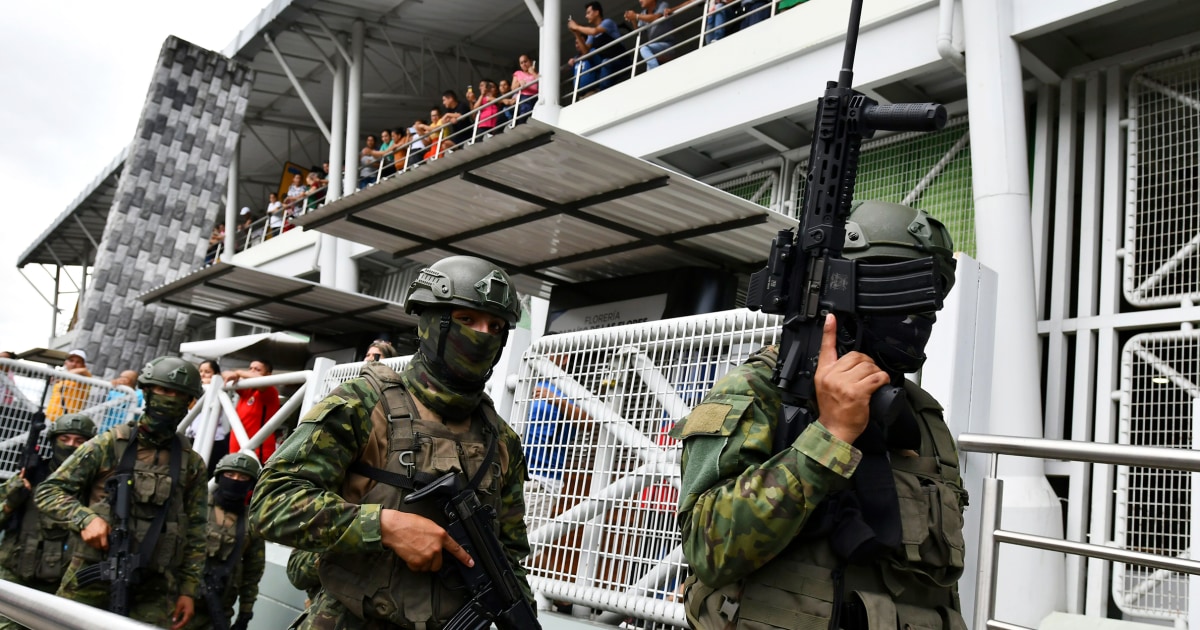
Mucarsel-Powell was born in Guayaquil and arrived in the U.S. with her mother and sisters when she was 14 in the 1970s, when military dictators ruled the country. When she was 24, her father was killed by criminal gun violence in Ecuador.
Despite witnessing tanks in the streets when she was growing up, “I have never seen the penetration of cartels using violent means to kill police officers and take police officers hostage,” she said. “This is a situation that could very quickly result in an internal civil war.”
“I remember what it felt like to leave a country where you have political corruption, incivility and violence — that brings back memories, and I am just extremely concerned for the entire Ecuadorian community.”
On Thursday, Ecuador’s President Daniel Noboa, gave details on plans for two high-security prisons after he declared on Wednesday that the country was “at war and we cannot cede in the face of these terrorist groups.”
His declaration came after Ecuadorians, and then the rest of the world with the help of television and social media, saw masked gunmen take over a public television station in the port city of Guayaquil and hold its staff at gunpoint before police moved in. The country has also been rocked by several explosions, the abduction of police officers, prison guards and staff, and several killings, including of police officers.
The country has been seeing violence grow as drug traffickers try to seize control of ports and passage for illegal drugs, particularly cocaine.
On Thursday, police evacuated people from a terminal near the public transport station in the nation’s capital, Quito, in response to what turned out to be a fake bomb threat, The Associated Press reported.
Katy Carrillo, 53, of Orlando, Florida, said most of her family still lives in Ecuador, with some in Quito and others in Guayaquil — and they’re all scared.
Family members have told her they try not to leave their homes “but sometimes we all have obligations that take us out of the house,” she said, adding that her family is adhering to the curfews.
‘Great anxiety and fear’
“Everybody is trapped in great anxiety and fear because it is difficult for people to assess how great is the danger of going out to the street and opening a business,” said economist Augusto de la Torre, an adjunct professor of international affairs at Columbia University who has family in Ecuador, mostly in Quito.
“This is a shocking situation. One gets the impression we are losing the country and one hopes that the police and military do not lose control of the monopoly of the armed forces,” said de la Torre, the World Bank’s former chief economist for Latin America. “These gangs seem to be well armed. They have demonstrated to have great control over the jails, and drug lords seem to operate from the jails as they were in their offices almost.”
Noboa’s government has named 22 gangs as terrorist organizations. Rear Adm. Jaime Vela, head of the country’s armed forces, said at a news conference Wednesday that 329 gang members had been detained.
Noboa said he was planning to deport more than 1,500 foreign prisoners from jails this week. He said he has a pledge for aid from the United States, Reuters reported.
The government imposed a national curfew after convicted gang leader Adolfo Macías Villamar, known as “Fito” and the head of the powerful Los Choneros gang, disappeared Sunday from prison in Guayaquil.
De la Torre said many Ecuadorians tie the violence to an ongoing corruption scandal; the country’s Attorney General Diana Salazar uncovered connections between drug traffickers and political officials in the assembly, high levels of the justice system and others. She released the chats online.
Never a producer of cocaine, the country’s port became important to traffickers trying to move drugs in the 2000s. “I think we generally have a consensus of what the roots for that problem are. Now we are just seeing it coming to the surface,” de la Torre said.
Mucarsel-Powell said she’s going to keep pushing “to make sure the U.S. is clear in its support of President Noboa’s efforts to stop this violence.”
In Orlando, Carrillo was worried about the situation for her relatives in Ecuador. While she said it’s too soon to know if the government’s actions will bring things under control, the situation has to get better. “There’s too much insecurity,” she said.






